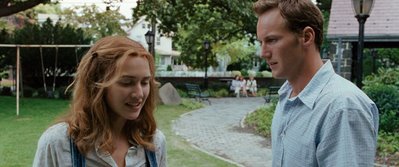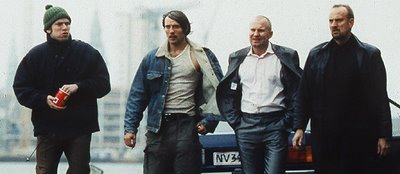
I have been a long time fan of Terry Gilliam's work. His animation work in the Monty Python series never ceased to delight and once he moved into feature length filmmaking, his creative genuis only shined that much more brightly. From classics like Brazil, Time Bandits, and The Adventures of Baron Munchausen to the picaresque gem The Fisher King and Gilliam's Twelve Monkeys, an excellent reimagining of Chris Marker's La Jetee, each of his films captured my imagination and helped to reshape what I thought was possible within the medium of film. So, it was with an unbridled enthusiasm that I rushed the DVD of Tideland from my mailbox directly to my DVD player.
For those of you who are unaware, Tideland is the 'other' Gilliam film released in 2005 (the well known one being The Brothers Grimm). Based upon a book by Mitch Cullin, the film's protaganist is a young girl named Jeliza Rose. Her father Noah, played by the always excellent Jeff Bridges, is a junkie who, when conscious, spins tales of travelling to Jutland. A country that seems equally mystical to Noah as it does to Rose.
The film wastes no time in announcing what is in store for the audience. We see Rose manuevering her way around her decrepit environment, preparing her father's drugs for him, and then injecting him with them while he rambles on about Jutland and vacations. Better skilled then some nurses who've drawn blood from me, Rose performs this activity adeptly while also reacting quickly to redirect Noah's slumping hand, causing his cigarette to land in the ash tray rather than on the floor.
Next up for Rose is to perform the same task for Queen Gunhilda (Jennifer Tilly), who I believe is supposed to be her mother (it is a little unclear in the film). Gunhilda is downright revolting, and in a scene that induced the first of many moments of recoil, she smothers Rose against her armpit, blows smoke in her face, crys about how she loves Rose, and then smacks her in the face while yelling "You little bitch!" because Rose had the audacity to reach for some of Gunhilda's chocolate. Mind you this is after Rose had just massaged Gunhilda's legs and then shot her up on methadone. It is no surprise that Rose spends her time reading Alice in Wonderland and talking to her friends who are just the heads of dolls she keeps on her fingers.
And that is the first act, ending with the abrupt overdose of Gunhilda a couple hours later. Not knowing what else to do, Noah and Rose leave the body to embark on a journey, potentially all the way to Jutland, although one is given the distinct feeling that while Jutland may be the destination they will never reach it.
Up until this point in the film, I felt that it had great potential. It turns out that their first stop is Rose's grandmother's house. Upon arrival there is a great, touching moment where Noah, in an explosion of frustration, kicks some furniture and then smashes on a severely out of tune piano. He then completely receeds into himself, staring down while the camera holds in an intmate close-up of his face. I thought this moment was one of the best in the film and one that foretold of the possibile direction the movie could take between Noah and her daughter. How wrong I was.
What unfolds is a story that spirals away from Bridges's character (he's still there just not in the way you might expect) and envelopes Rose in a world that includes her finger puppet/doll head friends, a metally challenged boy obsessed with killing the great shark, and a one eyed woman of black who easily would have filled the role of the 'crazy woman' that the neighborhood kids thinks is a witch, except that in this film she really is psychotic.
Through twists and turns it is revealed that every character in the film is psychologically traumatized in one way or another and Gilliam simply follows Rose around as she navigates through one potentially warping situation to another through the innocence and imagination that only a child can have. It's all here really, child abuse, drug use, necrophilia, take your pick.
Gilliam is no stranger to mind bending journeys of the imagination but he has always kept these films grounded in deeply personal, character driven stories. He attempts that here and unfortunately I feel that he failed in that attempt.
It appears as though the relationship Rose forms with the mentally challenged boy, Dickens, is supposed to carry the story through the second act, but instead of being touching and funny it most often just caused me to have the shivers and consider taking a shower to feel clean. The only real investment I had with any of the characters was Rose, but that was only in the sense that I just wanted her to get out of her situation as quickly as possible, which of course would have caused the movie to end.
So I sat for two hours, repeatedly cringing, or physically recoiling from the screen. Not that there isn't its bright moments, and yes I even laughed occasionally, but when it was all said and done I felt the cringe worthy moments far overshadowed the film's bright ones. That's not to say cringe worthy moments are generally a bad thing, but in the case of Tideland I felt it was.
While I am not sure if it was added for the DVD or if it was also on the theatrical relase, Gilliam appears before the film to essentially give a warning to the audience. He walks a fine line in this film and unfortunately I don't think he walks it successfully. Perhaps my opinion of that could change over time and with repeated viewings, but this is where it stands at the moment.





